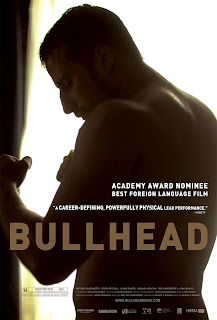Last year's winner was a film from Iran called A Separation which was definitely the best entry in the category. A Separation is an incredibly powerful film that builds slowly but by its ending has become absolutely incredible. I ranked it as my #5 film from last year. It is just that good. If you haven't seen it yet, you need to rent it immediately. Move A Separation to the top of that Netflix queue.
I have written about Belgium's entry, Michaël R. Roskam's Bullhead here.

Israel's entry Footnote was also pretty excellent. It is a rather hard satire of two academics, a father and a son. One is a theorist and the other has decided that what he does is "science", although what he really is a philologist, a student of language and language patterns. He, of course, wants to be a scientist so that he can think of his own work as more important than the work that other people (in this case his son) do. Foucault talks about this tendency among scientists. (If I may, sometimes I think that the turn toward cognitive science in performance studies and theatre studies smacks of this kind of scientist discourse – understandable in a discipline [art] that constantly needs to justify itself.) Blah blah blah. Anyway, Footnote makes fun of this man outright, and isn't much kinder to his academic son, whose work is actually appreciated by the academy. Both men are figures of ridicule in Joseph Cedar's movie, and Footnote manages, therefore, to be both quite funny, and quite politically pointed. As an academic, it resonated.

Less interesting was Canada's film Monsieur Lazhar. It is about a teacher who substitutes for a primary-school classroom after the students' teacher commits suicide in the classroom. I was mostly bored by this movie. It is fairly standard fare, but it makes a few unobjectionable points about the nature of grief as well as an (obvious and rather conservative) argument that we don't listen enough to kids, and that they know how to deal with things better than adults know how they ought to deal with them. The best thing about the movie is the performance by a young man named Émilien Néron who might rival Quvenzhané Wallis as the most heartbreaking child of 2012. Little Émilien is absolutely incredible. He might be reason enough to watch Monsieur Lazhar.
And that brings us to Poland's entry, Agnieszka Holland's In Darkness, which is honestly not interesting at all. This will sound dismissive, but In Darkness is The Diary of Anne Frank in the sewers of Poland. To be sure, it is beautifully filmed, and the acting is great. But... I guess I am not sure what the point of another Manichaeist film about Nazi Germany accomplishes. Nazis are bad. Nazi-sympathizers are bad. People who help European Jews are good people. I believe all of this. And I understand that not everyone does believe this. But for me a film like In Darkness has as much conflict as, say, Captain America. There are so many good movies about this period in history, but In Darkness is no more interesting than a film like Defiance, and I think that's saying a lot. But enough about how uninteresting In Darkness is. Let's talk about its star, the beautiful Benno Fürmann.
I mean, do you know what I'm talking about?
He's just... so... good looking.
One of the points of conflict in In Darkness is whether or not this girl is going to fall in love with Benno Fürmann or not. This is presented as a conflict. Frankly, I don't see one.


























